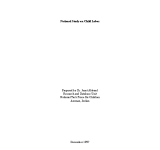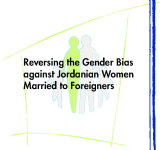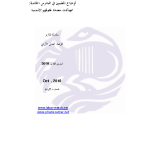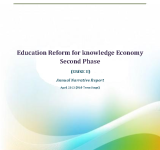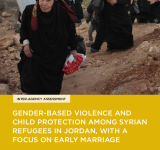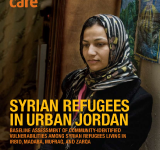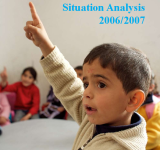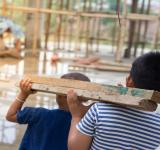This report analyzes the nature of child labor in Jordan. Child labor is defined as “the active participation of any child less than 16 years of age in any economic activity;; regardless of the type of work;; the employer;; the nature of the job;; or the activity.” This report examines the magnitude of child labor in Jordan based on the existing information and the collection of additional field data (both qualitative and quantitative) on the causes;; conditions;; and consequences of child labor. This report also aims to identify sub-populations of children most at risk to child labor;; investigate inadequacies in Jordanian laws and legislation with regards to child labor;; and examine vocational training programs and existing non-formal education programs for school drop-outs in relation to child labor. With regards to methodology;; information on child labor in Jordan was obtained through both primary and secondary sources;; including previous studies;; interviews;; and a field survey. After careful analysis;; this report makes a number of recommendations which aim to combat illegal of harmful child labor in Jordan.
school
تهدف هذه الدراسة إلى الكشف عن التحديات التي تواجه النساء الأردنيات المتزوجات من رجال غير أردنيين وأبناءهن أيضاً. وتشمل الدراسة على تحلييل التكاليف والمنافع المترتبة على منح الإقامة والحقوق المدنية لهذه الفئة;; وذلك بهدف توفير صورة دقيقة لصانعي القرار لمعالجة غياب المساواة من وجهة نظر اقتصادية. وبشكل منفصل تسلط الدراسة الضوء على أثر حرمان أبناء تلك الأسر من هذه الحقوق;; وتحديداً ما يتعلق في شعورهم بالإنتماء. وكانت منهجية الدراسة مزيجاً من البحثين النوعي والكمي. وبلغ حجم العينة في المسح الكمي 230 رجل أردني متزوج من امرأة غير أردنية;; و210 امرأة أردنية متزوجة من رجل غير أردني في كل من: الزرقاء;; العقبة;; سحاب;; مادبا البلقاء.
ياتي اصدار هذا التقرير في ضمن سلسلة التقارير الشهرية التي يعدها المرصد العمالي الأردني التابع لمركز الفينيق للدراسات الاقتصادية والمعلوماتية بالتعاون مع مؤسسة "فريدريش ايبرت" الألمانية. وهذا التقرير أصدر في يوم المعلم العالمي;; ويتناول الظروف التي يعمل فيها المعلمون والمعلمات العاملون في المدارس الخاصة ورياض الأطفال في مختلف مدارس القطاع الخاص في الأردن. وكما يتناول أعداداً للعاملين في هذا القطاع وتوزيعهم الجغرافي في مدارس المملكة. واعتمد التقرير على جمع بيانات أولية حول أعداد المدارس الخاصة والعاملين فيها والمعلمين من أكثر من مصدر;; وهذا إلى جانب اجراء العشرات من المقابلات الشخصية مع العديد من المعلمين العاملين في هذه المدارس. وكما قدم التقرير مجموعة من التوصيات التي من شأنها التخفيف من الانتهاكات التي يتعرض لها العاملون في هذا القطاع.
The second phase of the Program Education Reform for the Knowledge Economy Program (ERfKE II) continues to build on the achievements of the first phase and follow the same implementation arrangements that have proven to be successful in (ERfKE I);; and in the same time;; focuses on schools as the locus of change as well as on the need to enhance capacity building at the central and field levels. The development objective of (ERfKE II) is to provide students enrolled in pre-tertiary education institutions in Jordan with increased levels of skills to participate in knowledge economy. Also the Mid-Term review highlighted the concrete progress achieved by (ERfKE II) in several key areas related to policy development;; quality of education interventions and school construction;; and identified the key issues as a summary of the overall progress that will be tackled and addressed during the remaining stage of implementation.
The report aims to address the particular needs and cultural dynamics of Syrian refugees residing in Jordan;; especially with regards gender-based violence and child protection issues. It presents a comprehensive range of perspectives from urban Syrian refugees and local Jordanian decision makers in government;; community-based organizations and the religious and education sectors. The assessment of this report is based on data collected through three methodologies including questionnaire survey to refugees outside the Za’atari refugee camp;; focus group discussions in regions across Jordan and in-depth interviews. Key findings of the report are 1. The rates of early marriage are high;; 2. A significant percentage of children contribute to the household’s income and 3. Restrictions on women and girls’ mobility constrain their participation in social and economic activities and access to basic services. The report recommends measures to prevent acts of sexual exploitation and abuse and ensure the needs of the most vulnerable members of the Syrian refugee population in the cities.
This report is a baseline assessment of community-identified vulnerabilities among Syrian refugees living in Amman;; Irbid;; Madaba;; Mufraq;; and Zarqa. The purpose of this report is to identify urban Syrian refugees’ current coping mechanisms and any gaps in services available to Syrian refugees in Jordan. The research methodology is both qualitative and participatory in design;; drawing from the UNHCR tool for Participatory Assessment in Operations. This report presents only the data from household interviews;; baseline assessment;; and the follow-up focus groups conducted with community members. The number of households surveyed was 240;; with a total number of 1;;476 household members and 89 focus group participants representing 534 household members. The report proposed general recommendations and interventions to deal with the main highlighted challenges (cash assistance;; strengthening community links;; vocational training;; physical activities ...etc).
يهدف هذا التقرير الى تحليل الانجازات التي تحققت للأطفال في الأردن. ويتضمن التقرير معلومات وإحصاءات عن صحة الأطفال والتعليم والمشاركة بالإضافة إلى حماية الطفل. ويشير أيضا الى ما يجب القيام به ويبين ما هي الفجوات. وكان أبرز ما خلص إليه التقرير أن الصحة العامة والصحة الإنجابية ليست موجهة بشكل كاف لاحتياجات المراهقين;; وكما أن التوعية الصحية متدنية بين الفتيات والذكور;; اضافة الى محدودية فرص الحصول على المعلومات والتثقيف حول نمط الحياة الصحي. وأن خدمات رعاية الطفولة تتويسع ببطء مع زيادة الوعي. والاشارة الى نسبة التسرب وعمالة الاطفال;; وشعور الشباب والنساء بخيارات المشاركة المتاحة. وبين التقرير أنه لأطفال اللاجئين الفلسطينيين الحق في الوصول إلى كافة الخدمات. واعتبار أن الفقر وسوء الأحوال الصحية ونقص التعليم;; جميعها عوامل تحرم الأطفال من كرامتهم;; وتهدد حياتهم وتقضي على آمالهم. وكما يقدم التقرير توصيات بشأن ما يجب القيام به لزيادة تحسين حالة الأطفال في الأردن.
يهدف هذا التقرير الى التعرف على مدى انتشار ظاهرة تشغيل الأطفال في الأردن الذين تتراوح أعمارهم بين 5-7 سنوات;; ومحددات التشغيل والالتحاق بالدراسة;; والانعكاسات المحتملة لهذا التشغيل على صحة ودراسة الأطفال. استند هذا التقرير على بيانات مسح عمالة الأطفال 2007 والذي تم تنفيذه من قبل دائرة الاحصاءات العامة بالتعاون مع منظمة العمل الدولية والتعداد العام للسكان والمساكن 2004. حيث غطى المسح 14091 أسرة.
